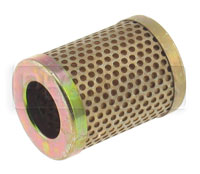How Fine a Filter Do I Need?
| Fluid filters are typically rated according to the nominal size of the openings in the filter media. Screen filters can also be rated by the mesh size (or "mesh count"). Mesh sizes can be confusing because they refer to the number of openings per inch. A larger mesh number translates to smaller opening sizes. |
| Mesh Count and Micron Ratings | ||||
|---|---|---|---|---|
| Mesh | Micron | Inches | Particle Size | Filter Example |
| 10 | 1905 | 0.075 | Sesame seeds | Stainless Wire Mesh Screen |
| 400 | 0.0157 | Coffee grounds | Internal Filter for Facet Cylindrical Pumps | |
| 60 | 250 | 0.0098 | Sawdust | Setrab 250 Micron In-Fitting Screen |
| 100 | 149 | 0.0059 | Table salt | Setrab Magnetic Inline Screen Filter |
| 115 | 0.0045 | 120 grit sandpaper | Fuel Funnel Screen Filter | |
| 200 | 74 | 0.0029 | Silt | Facet Fuel Pre-Filters |
| 40 | 0.0016 | Lower limit of visibility | Canton 40 Micron Cleanable Oil Filter Element | |
| 31 | 0.0012 | Pollen | Fuel Safe Sock Filter for Fuel Pickups | |
| 8 | 0.0003 | Red blood cells | Canton 8 Micron Oil Filters | |
| 5 | 0.000197 | Dust | Fram HPGC-1 High-Performance Fuel Filter | |
| 1 | 0.000039 | Bacteria | Canton Fuel Filter | |
Specific Recommendations:
Differential or transmission cooler: 149 to 1270 micron. This filter needs to protect the cooler passages from clogging.
Engine oil pre-filter (inspection filter): 40 to 1270 micron. This filter needs to protect the suction side of the pump from damage.
Engine oil main filter: 8 to 40 micron. Crankshaft journals are often finish-polished using 23 micron abrasives.
Fuel system pre-filter (before the pump): 25 to 400 micron. This filter needs to protect the pump from damage.
Fuel system final filter (after the pump): 1 to 40 micron. High-performance fuel injector manufacturers recommend a 10 micron or finer filter.
General rules of thumb:
For any given size, a coarse filter will flow better than a fine filter. This is why coarse filters are usually recommended for thicker fluids and as pre-filters. Increasing the filter size can (partially) compensate for the lower flow of a finer filter.
In any application, it is hard to go wrong with a coarse pre-filter before the pump with a fine filter after the pump. The fine filter protects the machinery, and the coarse filter protects the pump from damage. The coarse filter will also help to prevent the fine filter from clogging too quickly.


